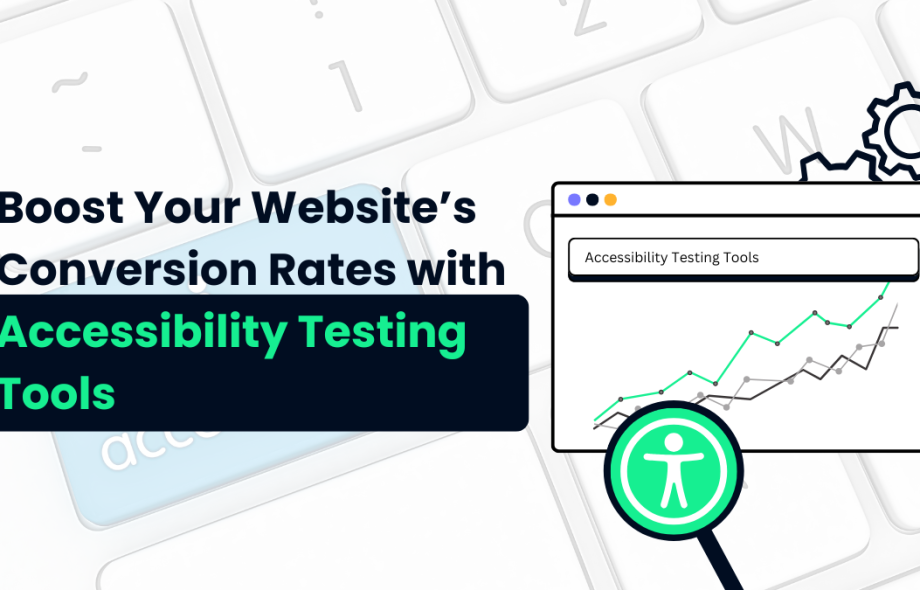A website’s success isn’t just about aesthetics or speed; it’s about usability for everyone, including people with disabilities. Neglecting accessibility can alienate a large segment of potential users, reducing conversions and engagement. Fortunately, Accessibility Testing Tools help businesses identify and fix barriers, ensuring that websites are inclusive and compliant with legal standards like the Web Content Accessibility Guidelines (WCAG).
Investing in Accessibility Testing does more than just improve user experience- it also boosts SEO rankings, enhances brand reputation, and increases customer retention.
Let’s explore the best tools that can help optimize your website’s accessibility and drive higher conversions.
Why Accessibility Testing Tools Matter for Website Conversion
Web accessibility directly impacts user experience, engagement, and conversion rates. If visitors can’t navigate your site due to accessibility barriers, they will leave- causing high bounce rates and lost revenue. Here’s why accessibility testing should be a priority:
-
Expands Audience Reach: Over 1 billion people worldwide have disabilities. An accessible website ensures inclusivity.
-
Enhances User Experience: A well-structured, readable, and navigable site benefits all users, not just those with disabilities.
-
SEO Benefits: Search engines favor accessible websites, improving rankings and organic traffic.
-
Compliance with Legal Standards: Avoid lawsuits and penalties by adhering to ADA, Section 508, and WCAG guidelines.
-
Improved Conversion Rates: A smooth, user-friendly experience encourages visitors to complete desired actions, like purchases or sign-ups.
Best Accessibility Testing Tools to Improve Your Website’s Performance
1. WAVE (Web Accessibility Evaluation Tool)
WAVE is a powerful accessibility testing tool developed by WebAIM. It provides a visual representation of accessibility errors and warnings directly on your webpage.
Key Features:
- Browser extensions for quick analysis
- Identifies missing alt text, contrast issues, and structural problems
- Helps ensure compliance with WCAG and Section 508
2. Axe Accessibility Testing Tool
Developed by Deque Systems, Axe is a widely used Accessibility Testing tool that integrates seamlessly with browsers and development environments.
Key Features:
- Open-source and developer-friendly
- Detects WCAG 2.1 violations in real-time
- Provides detailed issue reports with recommended fixes
3. Lighthouse
Google’s Lighthouse is an open-source, automated tool for improving website quality, including accessibility.
Key Features:
- Analyzes accessibility, performance, SEO, and best practices
- Provides a score-based evaluation with actionable insights
- Integrated into Chrome DevTools for quick audits
4. Tenon
Tenon is a versatile accessibility testing tool designed for developers, designers, and content creators.
Key Features:
- API-based testing for seamless integration
- Identifies WCAG compliance issues
- Supports automated and manual testing
5. Siteimprove Accessibility Checker
Siteimprove offers an all-in-one solution for website accessibility analysis and optimization.
Key Features:
- Automated scans for accessibility errors
- User-friendly dashboard with real-time monitoring
- Provides actionable recommendations for fixes
6. Pa11y
Pa11y is an open-source accessibility testing tool that helps developers automate website audits.
Key Features:
- Command-line interface for continuous testing
- Generates detailed reports on WCAG compliance
- Supports integration with CI/CD pipelines
7. Tota11y
Tota11y is a lightweight JavaScript-based tool that helps visualize accessibility issues on a webpage.
Key Features:
- Easy to install and use
- Provides an overlay highlighting potential issues
- Ideal for quick checks during development
How to Use Accessibility Testing Tools for Maximum Impact
Implementing Accessibility Testing Tools is only the first step. To truly enhance accessibility and boost conversions, follow these best practices:
Regularly Audit Your Website
Run automated and manual accessibility tests periodically to ensure ongoing compliance and usability.
Fix Issues Promptly
Address errors like missing alt text, improper heading structures, and color contrast issues as soon as they are detected.
Test Across Different Devices
Accessibility challenges vary across desktops, tablets, and mobile devices. Ensure a seamless experience on all platforms.
Get User Feedback
Engage users with disabilities to test your site and provide valuable insights for improvement.
Train Your Team
Educate developers, designers, and content creators about accessibility best practices to prevent future issues.
Common Accessibility Issues and How to Fix Them
Here are some frequent accessibility barriers and simple ways to resolve them:
1. Poor Color Contrast
-
Use contrast checkers to ensure text is easily readable.
-
WCAG recommends a 4.5:1 contrast ratio for normal text.
2. Missing or Improper Alt Text
-
Add descriptive alt text to images for screen reader users.
-
Avoid vague terms like “image123” or “photo.”
3. Lack of Keyboard Navigation Support
-
Ensure all interactive elements can be accessed via keyboard navigation.
-
Use the
tabkey to navigate and check for focus indicators.
4. Inaccessible Forms
-
Label all form fields clearly.
-
Use ARIA attributes to provide additional context.
5. Non-Compliant Headings and Structure
-
Use proper HTML heading hierarchy (
<h1>to<h6>) for clarity. -
Avoid skipping heading levels (e.g., jumping from
<h1>to<h3>).
To Wrap Up
Improving website accessibility isn’t just a legal requirement- it’s a competitive advantage. By leveraging Accessibility Testing Tools, businesses can create inclusive, user-friendly experiences that drive higher engagement and conversions. Whether using automated scanners like WAVE and Lighthouse or integrating developer-friendly tools like Axe and Pa11y, ensuring accessibility is a step toward a better digital future for everyone.
Start optimizing your website today and watch your conversions soar!
Read Our Recent Blog – 5 Common Mistakes to Avoid in Mobile App Test Automation
 :
https://au.pinterest.com/testevolve/
:
https://au.pinterest.com/testevolve/












